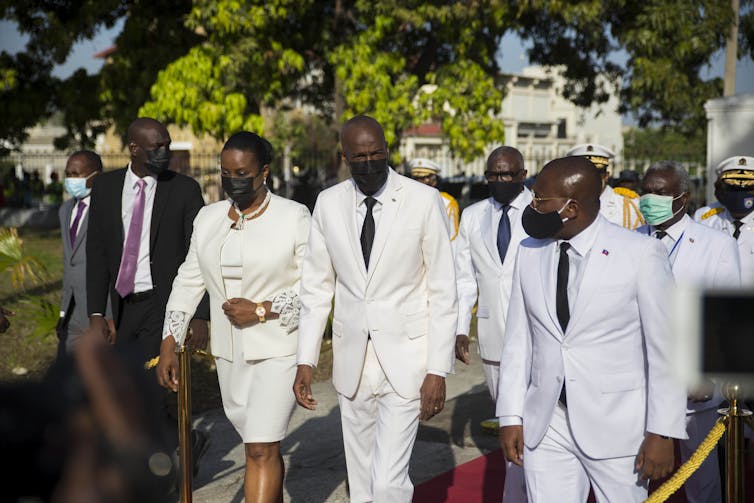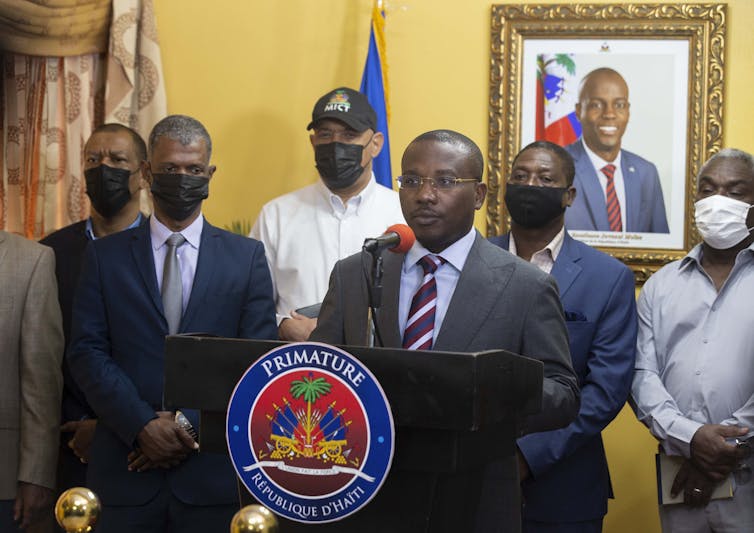Haiti hadn’t seen the assassination of a president of the republic in more than a century, when Vilbrun Guillaume Sam was slain in July 1915.
After its president was assassinated, Haiti needs international help more than ever
In order to recover from the assassination of the president, Haiti need to define a new vision for the country with a responsible and selfless commitment from Haiti’s civil society organizations and politicians.

The recent execution of President Jovenel Moïse revives a painful past. After the fall of the dictator Jean-Claude Duvalier in February 1986, Haiti chose to follow a democratic process, even if that choice proved difficult at times.
The new constitution of 1987, an important symbol of Haiti’s new start, established a five-year renewable mandate for the presidency. Jovenel Moïse came to power on Feb. 7, 2017 as the sixth president of the republic, elected with a constitutional term of five years.

I worked as a civil servant in the Haitian public administration for eight years and am now a doctoral student at the École nationale d'administration publique in Québec City. Jean-François Savard, my co-author, taught public policy design and implementation in Haiti as part of a Canadian federal government project to build capacity within Haiti’s public service. The analyses and conclusions we present here are drawn from our professional experience and research.
The reasons for the current chaos in Haiti
The main explanations the current chaos in Haiti can be found in the country’s political, institutional, economic and security conditions.
Despite being elected in the first round of the November 2016 presidential elections, Moïse only garnered 590,927 votes, about 10 per cent of the electorate. This made him the least popular head of state in Haiti since 1986.
Moïse’s legitimacy was further weakened this past February. Although his term of office was due to end, he clung to power, much to the dismay of Haiti’s political class and the general population, who demanded that he leave the national palace. Numerous demonstrations followed.
Moïse had been governing by decree since Jan. 13, 2020, when the mandate of the deputies of the 50th legislature and two-thirds of the Senate ended. Then, when the Haitian National Assembly was dissolved, Moïse failed to take the required steps to fill this legislative void. He had planned to hold a constitutional referendum Sept. 26 that would abolish the Senate and strengthen his powers.
With the lapse of parliament, Moïse was given free rein to appoint prime ministers, ministers and directors general on an interim basis without limit. The governmental and administrative apparatus of the state was further weakened as a result.

Economic and security crisis
When Moïse came to power in February 2017, he had little or no access to some of the economic levers that two of his predecessors, Joseph Michel Martelly and René Garcia Préval, had enjoyed. The latter were able to benefit from more than US$4 billion from the PetroCaribe fund, as well as from the largesse of international funding for development projects. In comparison, Moïse’s means for financing development projects for the country were limited.
Regarding security, the United Nations Security Council ended the mandate of the United Nations Stabilization Mission in Haiti in October 2017, eight months after the arrival of Moïse. The mission had been in Haiti since 2004 following the forced exile of President Jean-Bertrand Aristide.
With the departure of the UN mission, and a divided and anemic national police force, Moïse found himself with a major security handicap. This was made clear by the waves of kidnappings that affected all sectors of Haitian society and forced several institutions to limit their activities or simply close their doors. These kidnappings also provoked the ire of the population, further fuelling social tensions in the country.
To add to this, internal quarrels within his own party, the Haitian Tèt Kale Party, and conflicts with private sector oligarchs and most of the political class contributed to further isolating the president.
An abysmal political vacuum
What does the future hold for Haiti following the assassination of its president?
There has never been an institutional vacuum of this scale in recent history in Haiti. The current prime minister, Claude Joseph, and all the members of his government were appointed on an interim basis. To make the situation even more complicated, Moïse had appointed a different prime minister a day before his assassination. It was this new prime minister who would have had, among other powers, the mandate to form a new government.
So Haiti now finds itself with two prime ministers, each vying for the presidency.

The amended version of the 1987 constitution states that the prime minister will assume the presidency of the country in the event of a vacancy, pending the organization of elections. It is unlikely that the current prime minister, who suffers from a lack of legitimacy, will be able to fulfil this role.
Furthermore, the country’s current Provisional Electoral Council has little credibility to organize elections. Its current members have never been properly sworn in according to Haiti’s constitutional requirements. The Court of Cassation, at the judiciary level, is the other body that would have made it possible to fill this presidential vacancy. However, with the recent death of the president of this court and the dismissal of three judges by Moïse because of their alleged closeness to the opposition, the problem remains.
Haiti needs credible international assistance
Could the international community play a role? Because of the absence of legitimate leaders at the head of the Haitian state, the international community has no formal interlocutors who could intervene. The international community also lacks credibility in Haiti where its interventions, particularly through international aid, have always ended in failure. The inability of the Haitian National Police to fulfil its mission is the most recent example. The international community disengaged prematurely.
Furthermore, just as the country was starting to recover from the 2010 earthquake, several international stakeholders, including Canada, actually decreased their involvement in Haiti. In this regard, Canadian Prime Minister Justin Trudeau’s statement following Moïse’s assassination that “Canada has a deep and long-standing commitment to Haiti, and we stand ready to offer whatever assistance may be needed” appears incongruous.
The disengagement of the international community has only contributed to Haiti’s political, economic and social stagnation. Haiti seems to be returning to a situation similar to that of 2003 and 2004, when clashes between government authorities and civilian factions plunged the country into chaos.
How can Haiti recover intelligently in such a context?
For starters, the process will require responsible and selfless commitment from Haiti’s civil society organizations and politicians. Haiti also needs to have a process of frank dialogue among the main officials of national life, particularly those from the economic sector, in order to define a new vision for the country.
For example, one popular mechanism that has been proposed many times in Haiti, and that could eventually be used, would be the organization of a sovereign national conference. This large forum would bring together social and economic officials to discuss solutions that the state could adopt to solve the endemic problems that the country faces.
This vision will have to take into account the interests and needs of every Haitian. The partisan and exclusive approach that has prevailed ever since the 1806 assassination of Jean-Jacques Dessalines (the first head of state after the Haitian revolution from 1791 to 1804) must be definitively stopped.
The international community will then have to adopt a new type of support to direct toward the country. The international community must no longer impose directives; it must listen and offer advice on the best measures for Haiti to adopt.
Given Haiti’s chaotic economic situation, the return of international aid is unavoidable. But to ensure greater leverage, this aid must be more coherent, better co-ordinated, and supplied through a single channel. The support of the international community should also be seen from a perspective of several decades, in the hope that democracy can be established in Haiti once and for all.
![]()
Emmanuel Sael, Doctorant en administration publique, École nationale d'administration publique (ENAP) and Jean-François Savard, Professeur agrégé, École nationale d'administration publique (ENAP)
This article is republished from The Conversation under a Creative Commons license. Read the original article.








